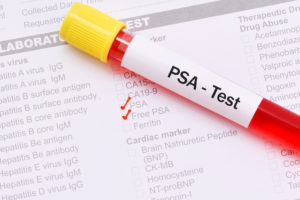Elevated PSA in men may signal problems with the prostate gland.
Prostate specific antigen (PSA) is a glycoprotein produced by normal prostate tissue and is measured by obtaining a blood sample. Several factors can cause an elevated PSA in men, including prostate cancer. However, having an elevated PSA does not always mean a cancer diagnosis. The best recommendation is to be evaluated by a urologist to determine why PSA levels are high.
Several non-cancerous conditions can cause an increase of PSA in the blood. Even common factors such as ejaculating during intercourse or having digital rectal exam of the prostate can cause slight elevations of PSA for a short period of time. Other contributors can include:
- BPH (benign prostate hyperplasia) or enlarged prostate
- Prostatitis – an inflammation of the prostate / infection. Prostatitis can be bacterial or non-bacterial.
- Urinary tract infection.
- Aging – PSA levels increase naturally as men age.
- Urinary retention – an inability to urinate.
- Perineal trauma – the body region where prostate is located). Men are usually offered an initial PSA test (PSA screening) at age 50 and PSA testing is done yearly thereafter.
Typically, it is recommended that men start being screened for prostate cancer once they reach their 50s. However, for African American men and those with a family history of prostate cancer, screening is usually offered starting at age 40.
Symptoms of elevated PSA in men
If an elevated PSA is due to a prostate infection or an enlarged prostate, symptoms commonly experienced may include:
- Dysuria – painful urination
- Frequent urination
- Urgent urination
- Slow urinary stream
Evaluation and treatment of elevated PSA
Men with an elevated PSA should undergo a thorough evaluation by a urologist. When visiting Urology Austin, a medical history will be reviewed, and a physical examination will be conducted. Because PSA can be elevated due to several conditions, blood testing will be ordered to look at “free” as well as “total” PSA, “PSA density”, and “PSA velocity”.
There are established reference ranges for PSA based on the age of the individual. For men suspected of having prostate cancer based on their PSA level, a digital rectal exam will be performed, and a prostate biopsy may be recommended.
If you would like to have a PSA blood test, or you have been diagnosed with an elevated PSA, contact Urology Austin to schedule an appointment with one of our urologists.
Related links

